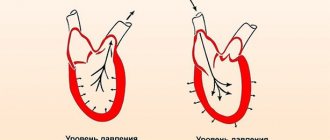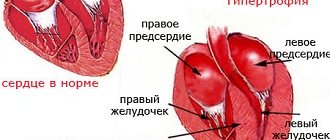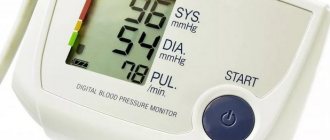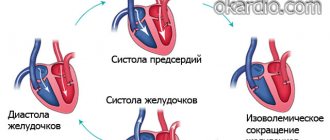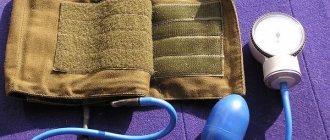Causes of the condition
When high blood pressure, the symptoms of which are pronounced, is observed against a background of high temperature (38 degrees and above), in most cases we are talking about the following painful conditions:
- cold;
- failure of the kidneys;
- thyrotoxic crisis;
- catecholamine crisis (pheochromocytoma);
- vegetative crisis.
These are the main reasons why a person has high blood pressure and fever at the same time. But each disease affects the body differently. Timely detection of the condition makes it possible to quickly react, visit a doctor and begin treatment.
Let's consider each of the pathologies in more detail.
How to prevent pressure surges?
People prone to pressure surges in the heat must adhere to the following rules:
- Minimize the time spent on the street between 11 a.m. and 5 p.m.;
- Wear loose clothing made from natural light fabrics and a hat;
- Regularly measure your blood pressure using a home blood pressure monitor to determine how your blood pressure changes when the air temperature rises;
- Do not stay in direct sunlight for a long time;
- Eliminate intense physical activity, opting for leisurely walks on the shady side of the street;
- Control the air humidity in the room - the indicator should not fall below 60%;
- Eliminate fatty and smoked foods and alcohol from the diet;
- Stay calm and avoid nervous tension.
If weather forecasters promise heat, you should consult a doctor in advance to clarify the dosage of medications in such situations, the possibility of using herbal remedies, the need to take medications that thin the blood and prevent the formation of clots.
Pheochromocytoma
Pheochromocytoma is a rare disease. Characterized by the development of a tumor in the adrenal glands. The neoplasm, which is usually benign, produces catecholamines - hormones such as adrenaline, dopamine, norepinephrine. These hormones are the cause of hypertension against the background of elevated temperature.
Timely treatment allows you to avoid life-threatening failures in the functioning of organs and systems of the body. It is worth noting that complications of the disease most often affect the cardiovascular system.
Most often, pheochromocytoma is localized in the adrenal glands
Other symptoms of the disease:
- weakness;
- muscle cramps;
- skin redness;
- chest pain;
- blurred vision;
- nausea, sometimes to the point of vomiting.
Pheochromocytoma can affect anyone at any age, but adults aged 30–50 years are at increased risk.
To make a diagnosis of pheochromocytoma, a thorough medical examination is necessary, since the signs of the disease are varied and may indicate other pathologies.
To combat crises, nitrates, Ca channel blockers, beta blockers, and alpha adrenergic receptor blockers are used. To completely eliminate the disease, surgical removal of the formation is required. Untimely or incorrectly selected treatment for a tumor in the adrenal glands leads to hemorrhage in the brain.
Elevated temperature due to hypertension
If temperature jumps are observed at elevated pressure, then this is a reason for diagnostics. There can be a huge number of reasons for the rise in temperature during hypertension. In each individual case, you need to carefully conduct an examination and prescribe the correct treatment.
An increase in temperature with pressure requires laboratory blood tests for hormones and an ultrasound scan of the thyroid gland.
If your blood pressure rises along with your temperature, this is a reason to undergo a full examination.
As a rule, therapy is carried out in a hospital setting, and the following drugs are used to stabilize the patient’s condition:
- antipyretics;
- agents that inhibit the synthesis of thyroid hormones;
- antihypertensive drugs (beta blockers, diuretics, ACE inhibitors, etc.)
In severe cases, oxygen is used.
Thyrotoxic crisis
Hyperthyroidism is a disease in which there is excessive production of thyroid hormones. Develops due to increased functioning of the thyroid gland. Hyperthyroidism is most often diagnosed in middle-aged women.
A dangerous complication of the disease is thyrotoxic crisis, in which the increase in thyroid hormones in the blood reaches a critical value. The crisis is accompanied by disruption of the cardiovascular system and can lead to death.
Weakness, temperature of 39 degrees or more with high blood pressure are the main symptoms of the onset of a thyrotoxic crisis. Injuries, infectious diseases, and pregnancy can trigger a crisis.
Thyrotoxic crisis is a life-threatening condition that requires urgent medical attention.
Other signs of the condition:
- tremor;
- muscle weakness;
- excited state;
- atrial fibrillation;
- lack of oxygen, increased heart rate;
- nausea, vomiting, bowel dysfunction.
To improve the patient's condition, infusion thyreostatics, therapy, beta-blockers, tranquilizers, and temperature-reducing agents are used.
Dizziness in the heat
The question often arises: why do you feel dizzy in the heat? This condition can be a symptom of various diseases, a sign of low blood pressure. Only a doctor can accurately determine the cause.
Dizziness occurs when heatstroke is an overheating of the body, leading to serious disruptions in the functioning of its systems. Very often, this condition occurs during heavy physical work in hot weather, for example, cultivating a garden. Causes may include wearing warm synthetic clothing in hot weather, drinking alcohol, and taking certain medications.
Most susceptible to heat stroke:
- Aged people;
- Small children;
- Pregnant women;
- People have a genetic predisposition to thermoregulation disorders.
In case of heatstroke, you need to go to a shaded place, lie down with your legs and head elevated, and drink cool water. You need to moisten your face with cold water and apply a wet cloth to your forehead and neck. You can wrap your body in a damp sheet and apply pieces of ice to your head in the forehead and back of the head.
Kidney dysfunction
An increase in pressure against the background of an increase in body temperature may signal a failure in the functioning of the kidneys. This occurs when the kidney artery narrows, due to which the organ does not receive nutrition in the required quantity, and waste products are excreted at a slower rate.
Antihypertensive and diuretic drugs are used to treat the condition. It is also possible to widen the artery through surgery.
If the problem is caused by the tumor pressing on the tissue, then surgery to remove it is necessary. In other cases, the vessel is expanded surgically.
Effect of temperature on blood pressure
To answer the question of whether pressure increases or decreases with temperature, it is necessary to consider the work of the heart muscle. Noticeable changes can be observed at high body temperatures. As you know, when the rate increases by one degree, the heart contracts faster by 10 beats per minute. This is due to the fact that the muscle warms up and the sympathetic nervous system is activated. As a result, blood pressure may increase.
The first stage of fever is characterized by an increase in blood pressure. In the third stage, when the temperature drops rapidly, blood pressure readings also drop sharply.
Vegetative crisis
A vegetative crisis is often accompanied by panic attacks. A crisis is characterized by the occurrence of an unreasonable attack of anxiety and fear that lasts several minutes.
The condition is common among people aged 25–40 years. Can be triggered by stress, abuse of tonic drinks. More common in women than men.
Symptoms of the main types of vegetative crises
Symptoms of a panic attack:
- difficulty breathing;
- increased heart rate (tachycardia);
- chest pain;
- trembling throughout the body, similar to chills;
- increased sweating;
- weakness;
- dizziness, headache;
- discomfort in the abdominal area;
- nausea, vomiting.
Blood pressure and temperature may change during the attack. High blood pressure can be observed against the background of low body temperature and vice versa.
At the end of the attack, uncontrolled urination or defecation is possible.
In some cases of autonomic disorder, there may be high blood pressure and low temperature. Low body temperature during an attack is accompanied by drowsiness.
To relieve panic attacks, experts prescribe tranquilizers, antidepressants, and beta-blockers. It is also recommended to adhere to a healthy lifestyle and deal with stress.
Fever and headache
Headaches in the summer heat are often a consequence of dehydration. With a lack of fluid, the blood supply to the brain, which consists of 90% water, deteriorates. If your head begins to hurt at the same time as a feeling of tightness in the chest and lack of air, shortness of breath and increased heart rate, this may indicate problems with the heart.
Help relieve headaches in hot weather:
- Cool shower or foot bath;
- Cold compress on forehead;
- Peace and quiet;
- Lack of bright light;
- Rest in a supine position on a high pillow;
- Compliance with the drinking regime (you can drink water with lemon).
If the situation worsens, you should consult a doctor. A headache may be a sign of sunstroke. If it is accompanied by vomiting, it is a dangerous condition and requires medical attention.
Diagnosis of the problem
Treatment will be effective if the patient is thoroughly examined and the doctor gives him an accurate diagnosis. You can get rid of elevated indicators only by eliminating the cause of the phenomenon.
The following stages of diagnosing the disease with these symptoms are distinguished:
- Questioning the doctor about complaints, general examination.
- Determination of blood pressure and temperature using appropriate instruments.
- An appointment for tests to determine the amount of hormones, as well as the condition of the liver and kidneys.
- MRI.
- Electrophysiological study of cardiac activity.
At the request of the doctor, the diagnostic stages can be supplemented. Having received the research results, the pathology is determined.
Prevention
Since acute respiratory infections cause high blood pressure, the first thing to do is reduce symptoms. Conventional preventive procedures that are easy to carry out at home will help:
- For now, avoid contact with a sick person;
- refrain from participating in public events during the epidemic;
- always wash your hands after leaving the house and do not put dirty hands in your mouth;
- To boost your body's immunity, eat a clove of garlic or a small onion.
Preventative measures are simple, and filling them regularly will save you from the flu and other colds. And if the flu is a common occurrence, you need to reconsider your lifestyle and change some things. This will help avoid progression of the pathology. We should not forget about periodic physical activity and proper nutrition.
How can you benefit from blood pressure information?
Atmospheric pressure changes not only with altitude, but also horizontally, moreover. constantly and very unevenly. Atmospheric pressure experiences both periodic (daily, annual variations) and non-periodic fluctuations.
It changes especially sharply during the passage of cyclones and atmospheric fronts, when in a matter of hours the pressure can change by 3-4 mmHg. As a rule, internal pressure immediately adapts to weather conditions, maintaining a balance between the internal and external environments. But not everyone can calmly tolerate sudden weather changes; for such people, the forecast of pressure changes can be especially important.
Thank you for reading the article! If you liked it, don't forget to give it a thumbs up and subscribe to the channel.
Source




